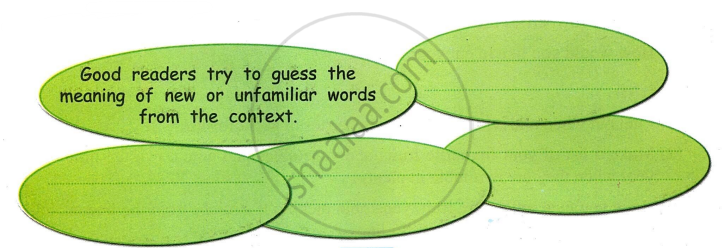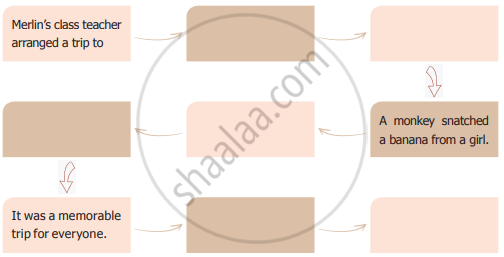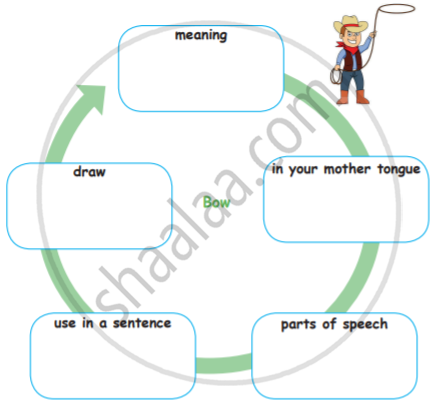Advertisements
Advertisements
प्रश्न
You have heard the proverb ‘Plan your work, work your plan’. It means - ________________.
विकल्प
Planning of the work is important.
Without planning work cannot be accomplished.
Make planning and work according to that plan.
Planning and work are two sides of the same coin.
उत्तर
You have heard the proverb ‘Plan your work, work your plan’. It means - Make planning and work according to that plan.
APPEARS IN
संबंधित प्रश्न
Life is a gift to be used every day,
Not to be smothered and hidden away,
It isn’t a thing to be stored in the chest
Where you gather your keepsakes and treasure your best;
It isn’t a joy to be sipped now and then
And promptly put back in a dark place again
Life is a gift that the humblest may boast of
And one that the humblest may well make the most of
Get out and live it each hour of the day,
Wear it and use it as much as you may,
Don’t keep it in niches and corners and grooves,
You’ll find that in service its beauty improves.
(1) What do we treasure in a chest?
(2) How does the poet went us to use the gift of life?
(3) Do you agree that life should be measured un deeds and not in years? Why?
(4) Which words in the poem mean the following :
(a) Kept from developing
(b) Hollow places in a wall
(5) Life is a gift to be used every day. [Name and explain the figure of speech]
Anne describes herself as a 'little bundle of contradictions'. Why? Explain in your own words.
Read the extract given below and answer the questions that follow:
Wear skins peeped through by bones and spectacles of steel
With mended glass, life bottle bits on stones.
(b) Explain: 'slag heap'.
(c) What future awaits these children?
(d) Name the figure of speech used in the third line.
Read the following passage and do the activities:
A1 True or False:
Rewrite the following statements and state whether they are ‘true’ or ‘false’.
(i) Mashelkar’s mother did menial work to bring him up.
(ii) Mashelkar’s father died when he was twelve.
(iii) Mashelkar was born in a very rich family.
(iv) Tatas added much value to Mashelkar’s life.
I start with my greatest guru-my mother. I was born in a very poor family and my father died when I was six. We moved to Mumbai and my mother did menial work to bring me up. Two meals a day was a tough challenge. I studied under street lights and I walked barefoot until, I think, I was twelve. I remember when I passed the seventh standard and I wanted to go into the eighth standard, our poverty was such that even to secure 21 rupees for secondary school admission became a big challenge. We had to borrow from a lady, who was a housemaid in Chaupati in Mumbai. That was the tough life I had.
In fact, I remember, my passing the SSC Examination-i.e. 11th standard. Those days it used to be not 10th standard or 12th standard but 11th standard. I stood 11th among 1,35,000 but I was about to leave higher education and find a job. What helped me was the scholarship by Sir Dorab Tata Trust. It was just 60 rupees per month and would you believe that 60 rupees per month from Tatas added so much value to my life that I have been able to stand here today before you to speak to you.
I am on the Board of Tatas now and it is very interesting that the same Bombay House where I used to go to collect that 60 rupees per month now one goes and sits there like a Director on the Board of Tata Motors. The turn that these 40 years have taken is very interesting. It has all been possible because of the chance I got to do higher studies at the insistence of my mother. She gave me the values of my life. She was one of the noblest parents I have met in my life.
So, my greatest guru was my mother. My second guru was Principal Bhave, about whom I made a mention earlier. He taught us Physics. Because it was a poor school, I remember, it had to innovate to convey to the young students the message of Science.
A2 Complete:
Complete the following sentences and write:
(i) Mashelkar was inspired by his greatest guru _______
(ii) Mashelkar studied under _______
(iii) Principal Bhave taught _______
(iv) The scholarship by _______ Trust helped him in higher education.
A3 Find the meaning:
Choose the appropriate meaning of the underlined words from the given alternatives:
(i) We moved to Mumbai and my mother did menial work.
(a) skilled
(b) hard
(c) unskilled
(d) of low status
(ii) Because it was a poor school, it had to innovate to convey to the young students the message of science.
(a) do a cheap experiment
(b) introduce new things
(c) avoid
(d) try hard
(iii) I got to do higher studies at the insistence of my mother.
(a) firm saying
(b) being inspired
(c) being inspected
(d) being instigated
(iv) That was the tough life I had.
(a) difficult
(b) soft
(c) cheap
(d) simple
A4 Match:
Match the following sentences with their tags:
| 'A' | 'B' | ||
| (i) | I stood 11th among 1,35,000 |
(a) | aren’t I? |
| (ii) | I am on the Board of Tatas | (b) | didn’t we? |
| (iii) | It was a poor school | (c) | didn’t I? |
| (iv) | We moved to Mumbai | (d) | wasn’t it? |
A5 Personal Response:
“Mother is the greatest Guru.” Discuss.
Answer the following question in 150-200 words:
How did Miss Sullivan help Helen Keller when she was studying at Cambridge School?
Briefly explain the following statement from the text.
“You have passed through a fantastic experience: or more correctly, a catastrophic experience.”
Discuss the following statement in groups of two pairs, each pair in a group taking opposite points of view.
The methods of inquiry of history, science, and philosophy are similar.
Discuss the following in pairs or in groups of four:
“Tribal arts are not specifically meant for sale.” Does this help or hamper their growth and preservation?
Discuss in pairs or in small groups
'Our daily life reflects a double allegiance to 'the life in time' and 'the life by values'.
How is the idyllic juxtaposed with the pedestrian in the poem?
Identify the words that help you understand the nature of the poet's father.
Read the following statement and mark those that apply to you.
I have cordial relationships with all but I cannot connect with anyone.
Select any one of the famous personalities mentioned in ‘Warming up 1’ on page no. 5. From the library or internet find out their success story. Write it in your own words in about 20 to 30 lines of your notebook.
Give your write-up a suitable title.
Make groups and discuss the following:
Did they themselves suffer from those problems/setbacks?
Some poets do not use uniformity in rhyming words, nor a steady rhythm. Such poems with no uniformity in rhyme, rhythm, length of lines or stanzas are called Free Verse. Walt Whitman, Ezra Pound, T.S. Eliot, Rabindranath Tagore are some famous poets who have composed poems in Free Verse.
A quick glance at the poem ‘Vocation' reveals that the style used by Tagore is Free Verse.
Now turn the pages of your textbook and see if you can find other poems in Free Verse.
Fibreglass kites led to creating power - driven aeroplanes.
Underline the verb in the following sentence and state whether the sentence is in the Active or Passive voice.
England gave Ramanujan great honours.
Suggest what you would do in the following situation:
You are going through a crisis that is making you short-tempered and impatient, due to which you end up causing harm to your family and friends. They have started complaining about it quite often.
Go through the following web that highlights the essential qualities of a compere. Discuss with your partner the essential qualities and also the precautions that a compere should take while compering a program.

Precautions to be taken :
- __________________________
- __________________________
- __________________________
- __________________________
Discuss and write 1-2 lines about the following.
Yonamine’s fight with Bushi (disguised as a bandit).
Present any one of the speeches given above.
Imagine that there is a Mr Somebody who has to correct all the wrongs that are done by Mr Nobody. Write in the following table, what Mr Somebody will have to do.
| Mr Nobody’s Actions | Tasks for Mr Somebody |
| 1. The plate is broken / cracked | Mend the plate. / Throw it away carefully. |
| 2. The book is torn | ____________ |
| 3. The door is ajar. | ____________ |
| 4. The buttons are pulled from the shirt | ____________ |
| 5. The pins are scattered. | ____________ |
| 6. The door is still squeaking. | ____________ |
| 7. There are finger marks upon the door. | ____________ |
| 8. The ink has spilled over. | ____________ |
| 9. Boots are lying around. | ____________ |
| 10. ____________ | ____________ |
| 11. ____________ | ____________ |
Add a few more things to the list in the above table, using your own ideas and experience.
Can you think of a similarity between a raven and a writing desk? Write at least five differences between the two.
Read the passage and answer the following:
When was the book written?
Talk about your favourite season. (A one-minute activity.)
Talk about the good qualities of any one person you do not like. (You need not name the person.)
Write about how you take care of your books.
Answer in your own words.
Why does a mother tell Neel about his Grandpa?
Write in your own words.
In which professions is a person forced to stay away from his home/ homeland for a long time? Try to guess why the poet is forced to stay away from his home?
Form groups. Discuss how one can be a 'good reader'. Use the points in the above passage in your discussion. Write down the points that show what makes a 'good reader'.

What are search engines?
Is the bird a crow?
The wind hurried and passed through the ______
Identify the character/speaker.
Wake up. You've been sleeping for too long.
He preferred handling mail by himself.
Neerja leapt into action when she______.
Why did the governments of India, America and Pakistan – honour Neerja?
Identify the speaker/character.
Don't worry, Madam, it's only a warning.
Recall Merlin’s memories and complete the story map.

Name the tools the farmer brought out. What did he do with them?
The dry earth soaked up the moisture as a hungry puppy laps up milk. It means______.
Work in pair, find answer for the question and share in the class.
What does the summer bring?
We get water by burning _______.
How did Santhosh spend his time in the river?
Who helped Jaswant in the battle against Chinese?
Brain of a robot is the______.
What robot will you make? Why?
Match their hobbies.
 |
swimming |
 |
cycling |
 |
gardening |
Write the rhyming word.
Tree - ______.
Recite the poem 'Treasure Trove' with the correct intonation.
What did the archer want to show to the crowd?
Try your own.

Find and write the clues.
Clue for the load on the camel ______
Read the advertisement and answer the question given below.

What is the name of the dealer?
Whose word are these? Name the character.
“I am not rich enough to buy this plate. This is a gold plate.”
What is the main idea of the story?
What sort of a boy is described in the poem?
Which part of the plant should be watered?
Where did they go to buy books?
Read the passage given below and make notes.
To match the best cities across the world, the Government of India initiated ‘smart cities’ to drive economic growth and improve the quality of life of people. The agenda under smart city promises to resolve urban sustainability problems. Urban forests provide a range of important ecosystem services that are critical for the sustainability of cities. Urban forestry, which is defined more as ‘Management of Trees’ contributes to the physiological, sociological and economic well-being of the society. Mangroves, lakes, grasslands, and forests in and around our cities, act as sponges that absorb the air and noise pollution and they present themselves as our cultural and recreational hotspots. However, these spots are rapidly being reclaimed and replaced in the name of development. Presence of urban green has shown to increase the economic value of the place.
Urban forests contribute to reduce the cost of building storm water drain systems for municipalities and neutralizing urban heat island effect. Plants not only provide shade but also help in regulating the micro-climate. They help regulate energy budgets, improve air quality, and curtail noise pollution. Trees, herbs, shrubs, and grasses arrest sedimentation and prevent other pollutants from entering our water systems. This will give a chance for our urban lakes and rivers to recover and help improve aquatic ecosystems. Biodiversity also gets a boost through the urban forestsand helps create corridors connecting the forest areas. High biodiversity areas can also help to build resilient ecosystems. Availability of forests within our urban areas gives an opportunity for children to connect to the natural environment and learn about native species.
